No, Rajiv, actually, you can't.
When it comes to responding to the challenges of the flat world, there is no help line we can call. We have to dig into ourselves. We in America have all the tools to do that, as I argued in Chapter 6. But, as I argued in Chapter 7, we have not been tending to those tools as we should. Hence, our quiet crisis. The assumption that because America's economy has dominated the world for more than a century, it will and must always be that way is as dangerous an illusion today as the illusion that America would always dominate in science and technology was back in 1950. But this is not going to be easy. Getting our society up to speed for a flat world is going to be extremely painstaking. We are going to have to start doing a lot of things differently. It is going to take the sort of focus and national will that President John F. Kennedy called for in his famous May 25, 1961, speech to Congress on “urgent national needs.” At that time, America was recovering from the twin shocks of Sputnik and the Soviet space launch of a cosmonaut, Yuri Gagarin, less than two months before Kennedy's speech. Kennedy knew that while America had enormous human and institutional assets-far more than the Soviet Union-they were not being fully utilized.
“I believe we possess all the resources and talents necessary,” said President Kennedy. “But the facts of the matter are that we have never made the national decisions or marshaled the national resources required for such leadership. We have never specified long-range goals on an urgent time schedule, or managed our resources and our time so as to ensure their fulfillment.” After then laying out his whole program for putting a man on the moon within ten years, President Kennedy added, “Let it be clear that I am asking the Congress and the country to accept a firm commitment to a new course of action, a course which will last for many years and carry very heavy costs... This decision demands a major national commitment of scientific and technical manpower, materiel and facilities, and the possibility of their diversion from other important activities where they are already thinly spread. It means a degree of dedication, organization and discipline which have not always characterized our research and development efforts.”
In that speech, Kennedy made a vow that has amazing resonance today: “I am therefore transmitting to the Congress a new Manpower Development and Training program, to train or retrain several hundred thousand workers, particularly in those areas where we have seen chronic unemployment as a result of technological factors, in new occupational skills over a four-year period—in order to replace those skills made obsolete by automation and industrial change with the new skills which the new processes demand.”
Amen. We too have to do things differently. We are going to have to sort out what to keep, what to discard, what to adapt, what to adopt, where to redouble our efforts, and where to intensify our focus. That is what this chapter is about. This is just an intuition, but the flattening of the world is going to be hugely disruptive to both traditional and developed societies. The weak will fall farther behind faster. The traditional will feel the force of modernization much more profoundly. The new will get turned into old quicker. The developed will be challenged by the underdeveloped much more profoundly. I worry, because so much political stability is built on economic stability, and economic stability is not going to be a feature of the flat world. Add it all up and you can see that the disruptions are going to come faster and harder. Think about Microsoft trying to figure out how to deal with a global army of people writing software for free! We are entering an era of creative destruction on steroids. Even if your country has a comprehensive strategy for dealing with flatism, it is going to be a challenge of a whole new dimension. But if you don't have a strategy at all... well, you've been warned. This is not a test.
Being an American, I am most focused on my own country. How do we go about maximizing the benefits and opportunities of the flat world, and providing protection for those who have difficulty with the transition, without resorting to protectionism or runaway capitalism? Some will offer traditional conservative responses; some will offer traditional liberal ones. I offer compassionate flatism, which is a policy blend built around five broad categories of action for the age of flat: leadership, muscle building, cushioning, social activism, and parenting.
Leadership
The job of the politician in America, whether at the local, state, or national level, should be, in good part, to help educate and explain to people what world they are living in and what they need to do if they want to thrive within it. One problem we have today, though, is that so many American politicians don't seem to have a clue about the flat world. As venture capitalist John Doerr once remarked to me, “You talk to the leadership in China, and they are all the engineers, and they get what is going on immediately. The Americans don't, because they're all lawyers.” Added Bill Gates, “The Chinese have risk taking down, hard work down, education, and when you meet with Chinese politicians, they are all scientists and engineers. You can have a numeric discussion with them-you are never discussing 'give me a one-liner to embarrass [my political rivals] with.' You are meeting with an intelligent bureaucracy.”
I am not saying we should require all politicians to hold engineering degrees, but it would be helpful if they had a basic understanding of the forces that are flattening the world, were able to educate constituents about them and galvanize a response. We have way too many politicians in America today who seem to do the opposite. They seem to go out of their way actually to make their constituents stupid-encouraging them to believe that certain jobs are “American jobs” and can be protected from foreign competition, or that because America has always dominated economically in our lifetimes it always will, or that compassion should be equated with protectionism. It is hard to have an American national strategy for dealing with flatism if people won't even acknowledge that there is an education gap emerging and that there is an ambition gap emerging and that we are in a quiet crisis. For instance, of all the policy choices that the Republican-led Congress could have made in forging the FY 2005 budget, how in the world could it have decided to cut the funding of the National Science Foundation by more than $100 million?
We need politicians who are able and willing to both explain and inspire. And what they most need to explain to Americans is pretty much what Lou Gerstner explained to the workforce of IBM when he took over as chairman in 1993, when the company was losing billions of dollars. At the time, IBM was facing a near-death experience owing to its failure to adapt to and capitalize on the business computing market that it invented. IBM got arrogant. It had built its whole franchise around helping customers solve problems. But after a while it stopped listening to its customers. It thought it didn't have to. And when IBM stopped listening to its customers, it stopped creating value that mattered for its customers, and that had been the whole strength of its business. A friend of mine who worked at IBM back then told me that when he was in his first year at the company and taking an internal course, his IBM instructor boasted to him that IBM was such a great company, it could do “extraordinary things with just average people.” As the world started to flatten, though, IBM found that it could not continue thriving with an overabundance of average people working for a company that had stopped being a good listener.
Читать дальше












